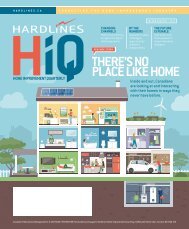HHIQ_3Q
Create successful ePaper yourself
Turn your PDF publications into a flip-book with our unique Google optimized e-Paper software.
MARKET REPORT<br />
FLE<br />
HOUSING UPDATE: TORONTO COOLS OFF<br />
AS WESTERN MARKETS HEAT UP<br />
Canada’s real estate market is cooling off, which may not be a bad thing. The good news is that<br />
dealers are staying busy—even as the house sales weather a correction.<br />
O<br />
ne-quarter of Canadian homebuyers<br />
say they feel pinched by changes<br />
to Canada’s mortgage lending<br />
rules, which includes a “stress test” to<br />
ensure that first-time homebuyers could<br />
withstand increases to mortgage interest<br />
rates. However, projections for the spring<br />
market show optimism, with most markets<br />
expected to remain stable or improve.<br />
These are just some of the findings of<br />
a recent survey conducted by Leger on<br />
behalf of real estate organization Re/<br />
Max. And while the slowdown can be<br />
expected to have an impact on new home<br />
construction, the repair and renovation<br />
market continues to be strong, based on<br />
anecdotal feedback from dealers across<br />
the country.<br />
House prices in the Greater Toronto<br />
Area actually fell almost 10 percent from<br />
the first two months of 2017, and prices are<br />
expected to continue softening throughout<br />
the year. At the same time, the average<br />
residential sale price in Western<br />
Canada continues to increase, apparently<br />
less impacted by the stress test rules than<br />
in Eastern Canada. Greater Vancouver<br />
saw prices increase almost 11 percent in<br />
January and February to $1,051,513, up<br />
from $950,184 during the same period in<br />
2017. Victoria has also seen an increase in<br />
average residential sale price, which was<br />
$831,000 in January and February this<br />
year compared to $761,000 during the<br />
same period in 2017.<br />
In Alberta, first-time homebuyers<br />
looking for affordability in Calgary and<br />
Edmonton continue to drive the market,<br />
House prices in the<br />
Greater Toronto Area fell<br />
almost 10 percent from<br />
the first two months<br />
of 2017 while Greater<br />
Vancouver saw prices<br />
increase almost 11<br />
percent at the same time.<br />
with single millennials and young couples<br />
gravitating toward the condominium<br />
market, which the Re/Max report says is<br />
relatively stable. The average residential<br />
sale price increased 1.4 percent in Calgary<br />
to $481,775 in January and February<br />
of this year, up from $475,288 in 2017. In<br />
Edmonton, by comparison, more housing<br />
inventory has resulted in a small increase<br />
in activity and more stable year-over-year<br />
prices going in to 2018.<br />
Activity in Atlantic Canada experienced<br />
increased demand from first-time<br />
homebuyers, many of whom are young<br />
couples and families. At the same time,<br />
the condo market is being driven by retirees<br />
who are looking to downsize. Prices<br />
continue to rise across most Atlantic<br />
markets, especially in Saint John, where<br />
the average residential sale price in January<br />
and February this year was $201,328,<br />
compared to $168,956 during the same<br />
period in 2017.<br />
By April, the market was continuing to<br />
soften, with sales down 2.9 percent from<br />
March, according to the Canadian Real<br />
Estate Association (CREA). Year-overyear<br />
sales were down even more dramatically,<br />
showing a 13.9 percent drop from<br />
April 2017. The number of newly listed<br />
homes also fell in April, down 4.8 percent<br />
from the previous month. And even<br />
though CREA’s house price index was up<br />
1.5 percent year over year, the year-overyear<br />
national average sale price declined<br />
by 11.3 percent in April.<br />
However, in speaking with dealers in<br />
several parts of the country, all are positive<br />
about business over the first half of the<br />
year—despite a slow start in most regions.<br />
With areas like Alberta on the rebound,<br />
and even Newfoundland, which took a<br />
downturn in 2017, getting busy again, the<br />
home improvement industry is well poised<br />
to weather the latest corrections in the<br />
housing market.<br />
10 THIRD QUARTER / 2018<br />
Hardlines Home Improvement Quarterly<br />
www.hardlines.ca
















